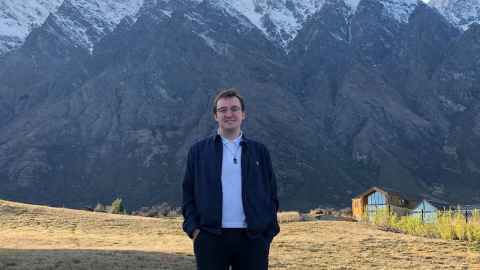He took foundational physics and is now teaching the course
16 November 2022
Dr Kannan Ridings teaches Tertiary Foundation Certificate and Tuākana students that the best work that they can do will come from collaborative efforts.

Dr Kannan Ridings (Rongowhakaata) struggled at high school – until he discovered science.
"In one of the first tests that we had for science at high school I ended up getting one of the top marks in the class. It just seemed to come naturally to me, and that sparked quite a bit of interest."
"As I went through high school I became more interested in physics. I remember in one of my classes the teacher said that nothing can go faster than the speed of light, and I thought 'wow that’s interesting, why is that?''"
"After high school I enrolled in the Tertiary Foundation Certificate and managed to do well enough to get accepted into a Bachelor of Science. I struggled quite a bit at first with studying, but in second and third year physics I hit my stride, and started getting quite good grades."
When Kannan was taking his third year courses in physics, an inspirational lecturer started at the University of Auckland: Professor Shaun Hendy.
"Shaun was teaching a particularly interesting course about condensed matter physics, and he was one of the best lecturers I've had. I was continuously asking questions and being annoying. Shaun went on to become my PhD supervisor in computational materials science."
I think that some of the students find it inspiring that somebody who's done the Tertiary Foundation Certificate before is now teaching them.
Shaun was the founding director of Te Pūnaha Matatini, a Centre of Research Excellence in complex systems hosted by the University of Auckland.
"When I first met Shaun was also when Te Pūnaha Matatini was first funded. I remember having some conversations with him about using innovation as a way to improve New Zealand's economy and move away from reliance on agriculture. Those were some interesting ideas to be exposed to."
As Kannan was in the final stages of his PhD, Shaun invited him to work on Te Pūnaha Matatini's COVID-19 programme. "One of the things which was great about joining that programme was that it was a team of great scientists, mathematicians and modellers," says Kannan. "Being in a team-based environment was quite different for me."
"Working on the COVID-19 programme taught me that a lot of the best science happens when you have not just an individual working on something, but when you get teams of people. The best projects and the best results come from collaboratively working together."
Kannan is now teaching the same foundational physics course that he took at the University of Auckland all those years ago. He is also a Tuākana mentor, offering academic support to Māori and Pacific students throughout their undergraduate experience.
The best projects and the best results come from collaboratively working together.
"Teaching foundational physics has been a rewarding experience. I think that some of the students find it inspiring that somebody who's done the Tertiary Foundation Certificate before is now teaching them."
Working in an interdisciplinary environment has exposed Kannan to a range of different methods, techniques and styles of science that he is excited to apply as his career progresses. He teaches his students that acquiring a wide breadth of skills will make them very employable, and shares his insights into what can be achieved through collaboration.
"Throughout my study and time with Te Pūnaha Matatini I've seen that you learn the most when you're working as a team. An individual is not going to solve something like climate change, it's going to involve more of a collaborative effort."
"Being exposed to these ideas and approaches at Te Pūnaha Matatini has been one of the biggest influences in what I try to talk to my students about today."
We're always looking for stories to share from our passionate Science students.
If you have a story, we'd love to hear from you. Email science-web@auckland.ac.nz.